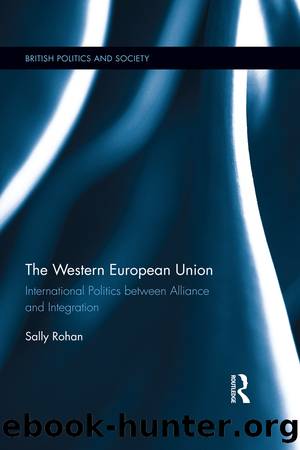The Western European Union by Sally Rohan

Author:Sally Rohan [Rohan, Sally]
Language: eng
Format: epub
Tags: History, General, Europe, Political Science, International Relations, Diplomacy, Security (National & International)
ISBN: 9781135767648
Google: ymIKBAAAQBAJ
Publisher: Routledge
Published: 2014-07-17T01:23:49+00:00
Planning for Action
The WEU Councilâs Petersberg Declaration of 19 June 1992 sought to move forward the positions taken in the declarations attached to the Maastricht Treaty, by outlining and developing substantive areas for progress. In fact, the key issue to be addressed by the Council was what the WEU was actually to do, given its stated commitments as the defence component of the EU and the means of strengthening the European pillar of the Alliance. After due Council consideration, and alongside its long-standing Article V commitment to collective self-defence, the WEU was to establish the scope of its missions, a task set which was collectively to take on the Petersberg name. Given the intention that the WEU become more âassertive in international peacekeeping and even peacemaking effortsâ, the role of WEU forces would extend beyond the Article V commitment of collective self-defence (effectively provided by NATO) to include the âPetersberg Tasksâ of humanitarian and rescue missions, peacekeeping, peacemaking and crisis management. Significantly, the Petersberg Declaration provided that âAs the WEU develops its operational capabilities in accordance with the Maastricht Declaration, we [the member states] are prepared to support, on a case-by-case basis and in accordance with our procedures, the effective implementation of conflict prevention and crisis-management measures, including peacekeeping activities of the CSCE or the United Nations Security Councilâ.175 This commitment contrasts with the position taken at NATOâs Ministerial meeting in Oslo two weeks earlier, where NATO had declared in very similar language its intent to support, on a case-by-case basis, CSCE peacekeeping activities but had excluded any specific commitment to the UN.176
Central amongst the Petersberg provisions were those relating to the strengthening of the WEUâs operational role. By identifying forces and mission types, and by establishing the concomitant planning mechanisms, the WEU would be able to fulfil its functions as the defence component of the EU and the means of strengthening the European pillar of NATO. The Peters-berg Declaration developed the concept of Forces Answerable to the WEU (FAWEU) whereby member states designated those military units and headquarters they would be willing to make available for use under the authority of the WEU, to act on decisions taken by the WEU Council, although the participation of national forces in specific operations would remain a sovereign decision. Drawn from across the whole spectrum of their conventional forces, FAWEU were to include forces with NATO missions and multinational units such as the Eurocorps.177 Significantly, in pre-Petersberg meetings the French and German Defence Ministers had agreed to establish the WEU as the âpolitical roofâ over the Eurocorps, which would not in itself constitute a European Army but only one of a range of forces potentially available for WEU operations.178
The development of the Planning Cell, envisaged under the Maastricht Declaration, was an important first step in providing the WEU with the planning capability that it would require if it was to truly develop operational competence. Major General Marcello Caltabiano of the Italian Air Force was to be the first Director of the Cell,
Download
This site does not store any files on its server. We only index and link to content provided by other sites. Please contact the content providers to delete copyright contents if any and email us, we'll remove relevant links or contents immediately.
The European Opportunity by Felipe Fernández-Armesto(571)
The European History Highway: A Guide to Internet Resources by Dennis A. Trinkle Scott A. Merriman(535)
Morgan Kaufmann Digital Watermarking and Steganography by Ingemar Cox Matthew Miller Jeffrey Bloom Jessica Fridrich Ton(529)
The Seven Wonders of the Ancient World by Michael Denis Higgins(521)
Hyperculture by Byung-Chul Han(511)
European Security without the Soviet Union by Stuart Croft Phil Williams(508)
European Security in a Global Context by Thierry Tardy(507)
The Routledge companion to Christian ethics by D. Stephen Long Rebekah L. Miles(499)
Get Real with Storytime by Julie Dietzel-Glair & Marianne Crandall Follis(444)
Hudud Al-'Alam 'The Regions of the World' - a Persian Geography 372 A.H. (982 AD) by V. V. Minorsky & C. E. Bosworth(439)
Tibetan Studies in Comparative Perspective by Chih-yu Shih Yu-Wen Chen(437)
Gorbachev And His Generals by William C. Green(429)
Governance, Growth and Global Leadership by Espen Moe(428)
CliffsNotes on Fitzgerald's The Great Gatsby by Kate Maurer(412)
How Languages Are Learned 5th Edition by Patsy M Lightbown;Nina Spada; & Nina Spada(408)
The Oxford History of the World by Fernández-Armesto Felipe;(388)
The Egyptian Economy, 1952-2000 by Khalid Ikram(387)
Oral Poetry and Narratives from Central Arabia: The Poetry of Ad-Dindan : A Bedouin Bard in Southern Najd (Studies in Arabic Literature, Vol 17) (English and Arabic Edition) by P. M. Kupershoek P. Marcel Kurpershoek(367)
The Oxford Handbook of the Incas by Sonia Alconini(365)
